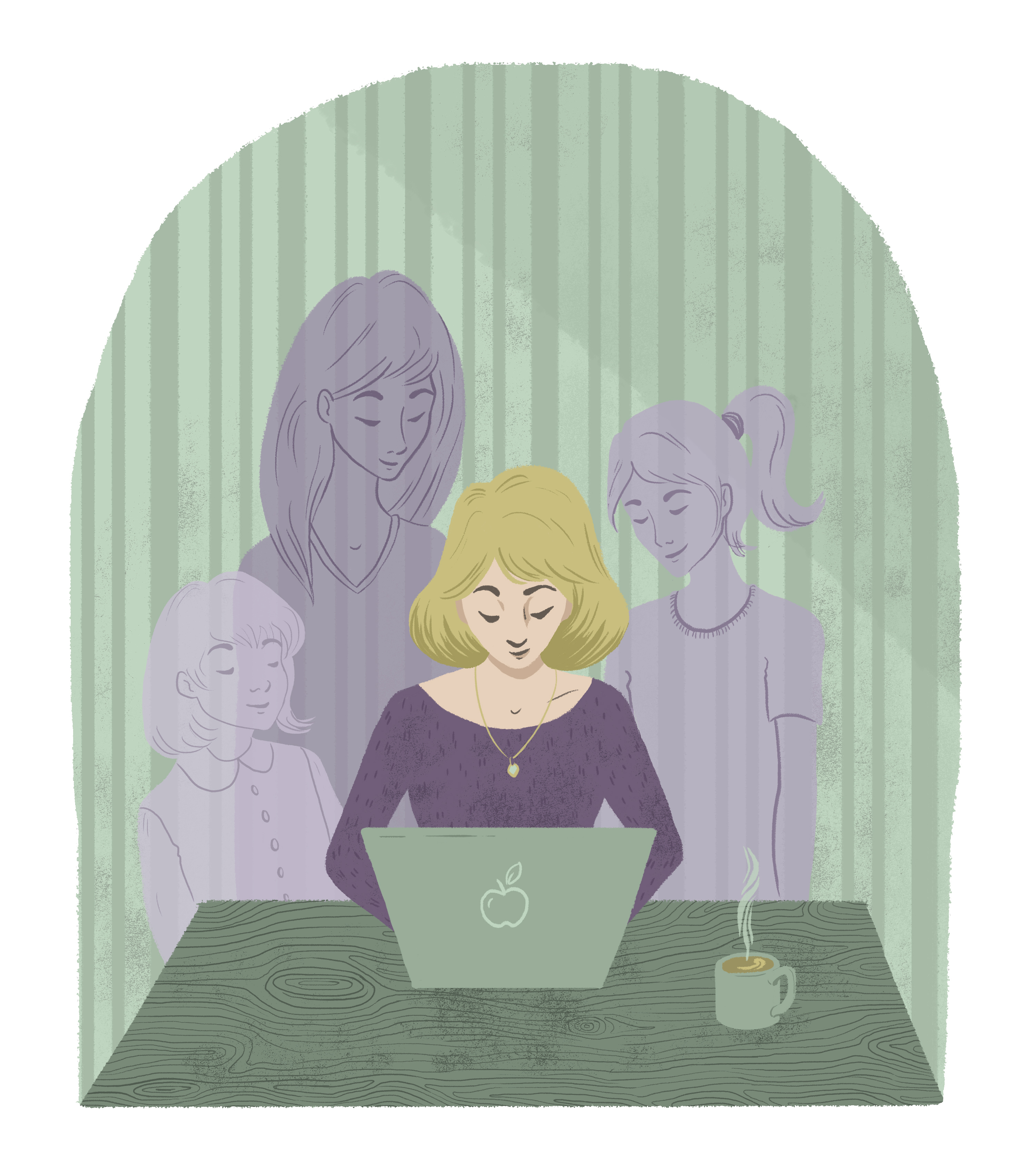- Sara Mansfield Taber
- The Memoirist Grows Up: As a memoirist writes she transforms as wordsmith & woman

The Memoirist Grows Up
illustration: "Memoirist" by Naomi Giddings
Memoir writing recapitulates ontogeny. This is something I've noticed as an instructor of hundreds of memoirists*: What I mean is: as a novice memoirist writes her life, she herself grows up. The memoirist, in tandem with her writing, develops along with the little girl she and her work are tracking. This trio--little girl resurrected from the past, adult woman in the present, and the writer learning to transfer experience into print--all start out as little girls and gradually, by stages, mature and grow toward emancipation. Via the writing, the child, the woman, and the writer all grow to adulthood. This is not as obvious and toss-off as it sounds. It is not lock-step nor a formula carved in stone and there are many variations—each woman writer is unique—but this is something, as a teacher of many writers, I have generally noticed to be true.
As the new-born memoirist approaches her first pages, she begins as the tiny child she once was, furiously suckling and sensing her world, and then, when she’s gained some heft, staggers onto her own two feet. The woman writing is her small beginner self as she writes her own beginner self, and the writing reflects it. Often this fledgling memoirist calls her mother "Mommy," for instance, and writes in the present tense. The present tense puts her right back there at the carnival on Cape Cod, being carried in her father's arms, awed by the swirling lights, the clanking ferris wheel, the smell of ponies, the feel of the sultry summer breeze, and the new delicious gritty sweetness of cotton candy in her mouth. The new scribbler at her desk is tentative at first, not knowing if she belongs in this new world, if it will feed her enough, if this new whirling-writing world is safe. She clamors for a handful of taffy to suck, she flashes her grin to get people to grin back, and, gaining confidence, she insists that she will ride the carousel pony without holding anyone's hand. For the writer is a child again, an upstart, a mere recipient of the world, a blank page to be scribbled on, an open receptacle for the senses. And this is useful, like babyhood a necessary and, indeed, perfect way to start to lay down her draft. For, with her infant diminutives, her present tense, and her sparking senses-- mastering sensory detail, a key element of vivid writing--the writer puts us with her there: "Mommy hands me something squishy! It floats in the tub! It bobbles and bloops and flips! How fun is ball!" And thus, the new writer, intuiting she is onto something--her littlest naked pre-school self is there on the page—continues toddling and writing along in this corporeal vein for quite a while, happily prattling and scribbling as she snatches at butterflies, licks her ice creams, does little dances for admirers, bats her sister in the noggin, and runs wailing to Nursie. And for a long time, the writer, this woman summoning her past, this little girl growing, and the scribbles on the page are quite and delightedly happy.
But then there comes a day when the woman, the writer furrows her brow and narrows her eyes, like a child squinched over a page of arithmetic. A sense of dissatisfaction sets in. "But that's all baby talk!" she suddenly thinks, mid-sentence. And, with this new-dawned awareness, she is seized and furiously writing in a whole new manner. She is in the social school world now and all the over-heard insults and verbal slashings of the schoolyard are smarting in her ears. That day Tommy shot the spit wad and it landed on top of her head and everyone killed themselves laughing at her. That day Tammy, her supposed best friend, told Betty what she’d said in utmost secrecy: that she thought Betty's hair looked like the Old Man's Beard moss she saw hanging from a tree down south. That day Billy took her by the hand and kissed her lips by the boys’ bathroom between lunch and music. Suddenly she is recalling bright and searing interactions, rather than only sense impressions, and setting them down in scenes with dialogue capturing open competition and conflict. "You said that." " I did not." "Yes you did, you creep!" And she and her writing are off and running again, but in a fleeter, more rambunctious vitality. Perhaps she changes to the past tense now--or maybe not, and maybe half way along this phase "Mommy" turns to "my (dumb) mother," as seventh grade petulance kicks in. She is still a kid, but a bigger one, full of spit and vitality and imitation, out to prove herself one of the gang. Feeling a sense of mastery with her vivid scenes, she begins to preen in the mirror, trying her chestnut waves this way and that, thinking she doesn't look so bad--until Betty, the one with the beard tresses, remarks one day that she liked that sleeker wet wheat field look she used to have and she's back to ironing her own hair. But industry and learning and self-improvement are what she's made for and what keep her going, this half-grown writer-this half grown girl. She's sure to get there yet. The thrill is all in the trying.
So, for many months and even years, our girl, our writer, contentedly toils along, creating little dramas of her life and on her page (while still plucking the caterpillars and apples she was attuned to when tiny—the dramas added to those bright earlier-recorded memory blots,) contentedly pleased with her jottings and her budding breasts, when, one day, she has a thought. Yes, a real thought, an abstract thought rather than a concrete one; a bit of pondering or reflection, whatever you wish to call it, floats into her head. It is newly as though she is no longer just doing, but watching herself do. And she is no longer simply blurting out feelings but pausing and noticing rivulets running beneath people’s surface placidities. She might try out the past tense now, beginning to glimpse the fact that it can give her more latitude for commentary and for play with time. "Jane was my best friend," she writes, "but it was weird: that afternoon she walked right by me in the hall, just looking off into space and tossing her hair as if she hadn’t seen me. If she treats me like that, I thought, she can forget that shoe-buying trip to Georgetown on Friday." That's the concrete writer, the reactive girl she's been up to this moment, but with a tentative change of tense. (Hear the greater distance and perspective in the tone with that handy past tense?) But the truth is, this girl is actually no longer a girl but a teenager, this memoirist-adolescent beginning to grasp something new, and that something new now slips onto the page like a dark but smart intruder--something one might call insight--that gives her work a sage, shiny, slippery, silky, maybe even sexy new dimension. And so she adds to her passage, "But then, after school, thinking back, I realized Jane had looked really sad. Oh God, I think she might have been jealous!, I suddenly thought." She thinks a little more and again bends over her page/computer screen and starts a new line, drawing further away to observe both herself and Jane. "Actually, I think we were both jealous of each other sometimes that year of ninth grade, though we tried not to show it..." And now, and now--development is hastening, it is picking up—she, the writer crosses out and revises, adding a daring bit of surmising to her scene. She writes, "Jane flitted by me as though she was composing one of her brilliant passages of music in her head. At first I felt like pinching her--that pinch-and-twist Tom and I used to subject each other to when our mother wasn't looking. But then I remembered that Jane had asked me to go see Romeo and Juliet with her on the weekend, something that flew out of my mind when Jed sidled up to me to ask me the same thing and I accepted his invitation instantly, without a thought. I couldn’t breathe when he was near by, but that was no excuse. It was awful. I’d effectively vaporized my friend. We’d agreed that if a boy—those superior creatures--asked one of us out, we ought to be able to accept and not worry about the other's feelings, but still, it did always hurt if one had a date and not the other. It was so tough balancing friendship and love." You hear that little bit of interpretation, that musing, that wisp of teen wisdom, filtering in there at the end?
Well, that is just the beginning...As the girl being written enters college and plunges deeper into the life-long search for fulfilling love and work, the writer increasingly gains optical distance from her younger self and her earlier writer, and begins to muse more deeply and confidently, adding such lines as "I was a feigner during those high school days.” Notice her firm use of past tense now. “Always, I was mimicking confidence in hopes that by pretending I could make it true. I would be the carefree artist, the free lover of men my mother forbid me to be. Like Virginia Woolf’s Lily Briscoe, I would cleave to myself.” And the writer now, this young woman who is actually 57, finally feels she is pulled together.
The order and content of these phases for the aspiring life writer can vary. Sometimes a fledgling memoirist issues petit wisdoms as her first jottings. Others may open the curtain with scenes, and only later record the fuzz on a peach. A memoirist may begin as an adolescent and only later go back to retrieve that leaf-pulling toddler she once was. We all know those who are born too pure and mature and only later discover popsicles and get peeved at friends like ordinary mortals.
In any case, now, at this closer-to-the finish phase of the writing, this writer-young woman’s pre-school and elementary and high school selves are united and on her side; her emotions and her thoughts happily inter-playing; her sensations, her scenes, her musings melding like butter, wheat and cinnamon on the page (are you tasting expertly whipped-up cinnamon buns?;) her child and adult outlooks synchronously marshaled in her typing fingertips; herself of a piece--so to speak, and she—the writer and the young woman of the story, are on their way to a complete and delicious manuscript, to a complete and delicious life. For all intents and purposes, she's grown up now--both the girl and the writer. And this is as good and as grown up as it gets.
But there is one last thing to say now, before we leave this happy, grown-up writer and this happy grown-up girl on the page, for we have forgotten the third member of the trio. The very most magical thing, to get back to my first bold contention, is: in the creation of her manuscript, not only does the memoirist grow up as a writer, but she grows up herself, as a woman. You might expect a 57 year-old woman to be already grown up, but always, always, there is more growing to do. While writing the memoir, as has been said often before, a writer re-lives her life, but she also actually develops, grows up as a person as she commits her mounting words to paper. As she describes and evokes her little girl and then bigger girl self on the page, as she dares to take her first blundering steps as a writer, and marshals the trust of the infant, the autonomy of the toddler, the rebelliousness of the adolescent, and the blooming confidence of the young woman, she, this 57 year-old woman gathers them all to herself, realizes all she has, blossoms in strength, steps into the sunlight, defies all, says her truth in her own way, and she, herself, becomes an even more mature, more emancipated and freer woman in the world.
*
I have chosen to refer to the memoirist as “she” because far and away the majority of the memoir writers who fetch up at the literary center where I work are women. Of course the pattern applies to male memoirists as well and the pronoun might be changed.
Writing Status Badges












Writing Status Badges












Featured Members (7)
Writing Status Badges







































